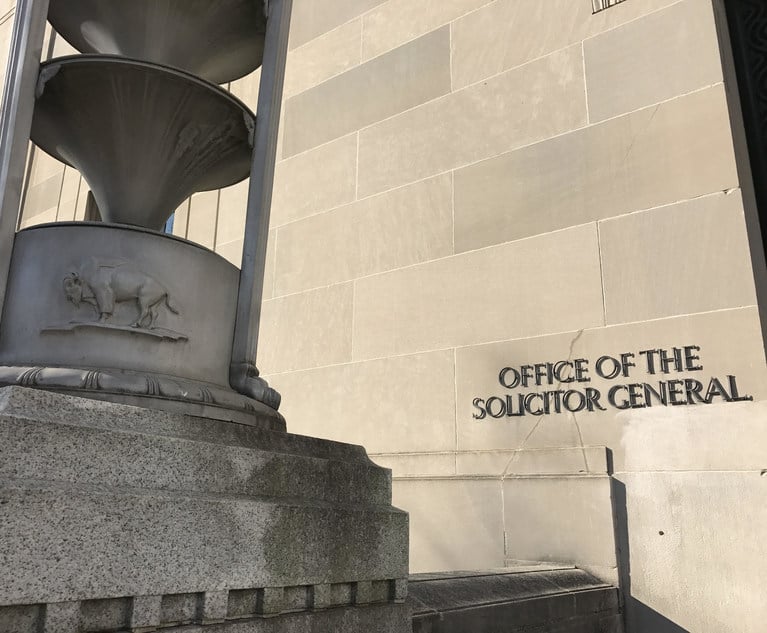 Muhammad Ali. Photo: Wiki Commons
Muhammad Ali. Photo: Wiki Commons The Marble Palace Blog: A Former Law Clerk's Favorite SCOTUS Movie
A former clerk reminisces about his favorite Supreme Court-related movie. What's your favorite SCOTUS movie?
February 18, 2022 at 09:31 AM
3 minute read
Thank you for reading The Marble Palace Blog, which I hope will inform and surprise you about the Supreme Court of the United States. My name is Tony Mauro. I've covered the Supreme Court since 1979 and for ALM since 2000. I semiretired in 2019, but I am still fascinated by the high court. I'll welcome any tips or suggestions for topics to write about. You can reach me at [email protected].
Former William & Mary Law School dean Thomas Krattenmaker has retired at age 79, though he still has a few clients. But he still gets a lot of phone calls from people seeking his expertise about a long-ago Supreme Court decision titled Clay v. United States.
Why? Because he was a former law clerk to Justice John Harlan II in 1971, one of the key justices who persuaded the Supreme Court to reverse, on procedural grounds, the conviction of Muhammad Ali for refusing to report for induction in the military. (Cassius Clay Jr. was Ali's previous name.)
One of the latest phone calls Krattenmaker received (apart from mine) was from the production company of Ken Burns, whose four-part series on Muhammad Ali was aired by PBS last fall. Krattenmaker made several appearances in the documentary to explain how Ali won after most of the justices had originally thought Ali should be convicted.
Krattenmaker thought the documentary was a good one, but to be honest, Krattenmaker continued, "I don't mind being quoted in saying I think the best movie ever made about the Supreme Court was 'Muhammad Ali's Greatest Fight,'" a 2013 HBO movie about Ali's legal battle.
"You have to realize that's a fairly low bar," Krattenmaker mused. "I think the other two cases about the court that I can think of are 'First Monday in October' [from 1981] and 'The Magnificent Yankee' [from 1950]." Krattenmaker was quick to acknowledge that other newer Supreme Court films such as "RBG" and "On the Basis of Sex," as well as "Amistad," in which Justice Harry Blackmun played a cameo role, have merit.
Of course, Krattenmaker may have a bias toward the HBO movie. He was recruited as a consultant for the movie to bring as much authenticity as possible.
In a 2013 interview, Krattenmaker told me the HBO movie was fairly accurate in showing the inner workings and deliberations of the Supreme Court. Famed actor Christopher Plummer, recently deceased, played Harlan, and Krattenmaker said, "Plummer was Harlan. He looks like him, sounds like him." (IMHO, it is a movie worth watching for those who want to learn about how the court works.)
Krattenmaker made several suggestions to the director for the sake of accuracy. Informed by Krattenmaker that Harlan's whiskey of choice was Rebel Yell, the filmmakers made the substitution—even making sure that they showed a bottle with the label that was used in 1971. Krattenmaker himself was portrayed by an actor as one of several law clerks who got involved in a fist fight between liberals and conservatives. Krattenmaker said no such fight occurred in reality.
Movies and television shows that attempt to reveal the inside working of the court often include law clerk fisticuffs and romances. Faced with the reality that the court can be a somnolent institution, directors often hype it with "West Wing"-style intensity, including scenes involving hot young law clerks.
When CBS in 2002 launched aTV series titled "First Monday," veteran advocate Carter Phillips of Sidley Austin watched it and famously called it "vomitous."
NOT FOR REPRINT
© 2025 ALM Global, LLC, All Rights Reserved. Request academic re-use from www.copyright.com. All other uses, submit a request to [email protected]. For more information visit Asset & Logo Licensing.
You Might Like
View All
Trump's DOJ Withdraws Opposition to Law Banning Trans Care for Minors

Supreme Court Denies Trump's Request to Pause Pending Environmental Cases

January Petitions Press High Court on Guns, Birth Certificate Sex Classifications

‘Diminishing Returns’: Is the Superstar Supreme Court Lawyer Overvalued?
Law Firms Mentioned
Trending Stories
- 1With DEI Top of Mind, Black Judges Discuss Growing Up During Segregation, Efforts to Diversify the Profession
- 2Big Law's Middle East Bet: Will It Pay Off?
- 3'Translate Across Disciplines': Paul Hastings’ New Tech Transactions Leader
- 4Milbank’s Revenue and Profits Surge Following Demand Increases Across the Board
- 5Fourth Quarter Growth in Demand and Worked Rates Coincided with Countercyclical Dip, New Report Indicates
Who Got The Work
J. Brugh Lower of Gibbons has entered an appearance for industrial equipment supplier Devco Corporation in a pending trademark infringement lawsuit. The suit, accusing the defendant of selling knock-off Graco products, was filed Dec. 18 in New Jersey District Court by Rivkin Radler on behalf of Graco Inc. and Graco Minnesota. The case, assigned to U.S. District Judge Zahid N. Quraishi, is 3:24-cv-11294, Graco Inc. et al v. Devco Corporation.
Who Got The Work
Rebecca Maller-Stein and Kent A. Yalowitz of Arnold & Porter Kaye Scholer have entered their appearances for Hanaco Venture Capital and its executives, Lior Prosor and David Frankel, in a pending securities lawsuit. The action, filed on Dec. 24 in New York Southern District Court by Zell, Aron & Co. on behalf of Goldeneye Advisors, accuses the defendants of negligently and fraudulently managing the plaintiff's $1 million investment. The case, assigned to U.S. District Judge Vernon S. Broderick, is 1:24-cv-09918, Goldeneye Advisors, LLC v. Hanaco Venture Capital, Ltd. et al.
Who Got The Work
Attorneys from A&O Shearman has stepped in as defense counsel for Toronto-Dominion Bank and other defendants in a pending securities class action. The suit, filed Dec. 11 in New York Southern District Court by Bleichmar Fonti & Auld, accuses the defendants of concealing the bank's 'pervasive' deficiencies in regards to its compliance with the Bank Secrecy Act and the quality of its anti-money laundering controls. The case, assigned to U.S. District Judge Arun Subramanian, is 1:24-cv-09445, Gonzalez v. The Toronto-Dominion Bank et al.
Who Got The Work
Crown Castle International, a Pennsylvania company providing shared communications infrastructure, has turned to Luke D. Wolf of Gordon Rees Scully Mansukhani to fend off a pending breach-of-contract lawsuit. The court action, filed Nov. 25 in Michigan Eastern District Court by Hooper Hathaway PC on behalf of The Town Residences LLC, accuses Crown Castle of failing to transfer approximately $30,000 in utility payments from T-Mobile in breach of a roof-top lease and assignment agreement. The case, assigned to U.S. District Judge Susan K. Declercq, is 2:24-cv-13131, The Town Residences LLC v. T-Mobile US, Inc. et al.
Who Got The Work
Wilfred P. Coronato and Daniel M. Schwartz of McCarter & English have stepped in as defense counsel to Electrolux Home Products Inc. in a pending product liability lawsuit. The court action, filed Nov. 26 in New York Eastern District Court by Poulos Lopiccolo PC and Nagel Rice LLP on behalf of David Stern, alleges that the defendant's refrigerators’ drawers and shelving repeatedly break and fall apart within months after purchase. The case, assigned to U.S. District Judge Joan M. Azrack, is 2:24-cv-08204, Stern v. Electrolux Home Products, Inc.
Featured Firms
Law Offices of Gary Martin Hays & Associates, P.C.
(470) 294-1674
Law Offices of Mark E. Salomone
(857) 444-6468
Smith & Hassler
(713) 739-1250








